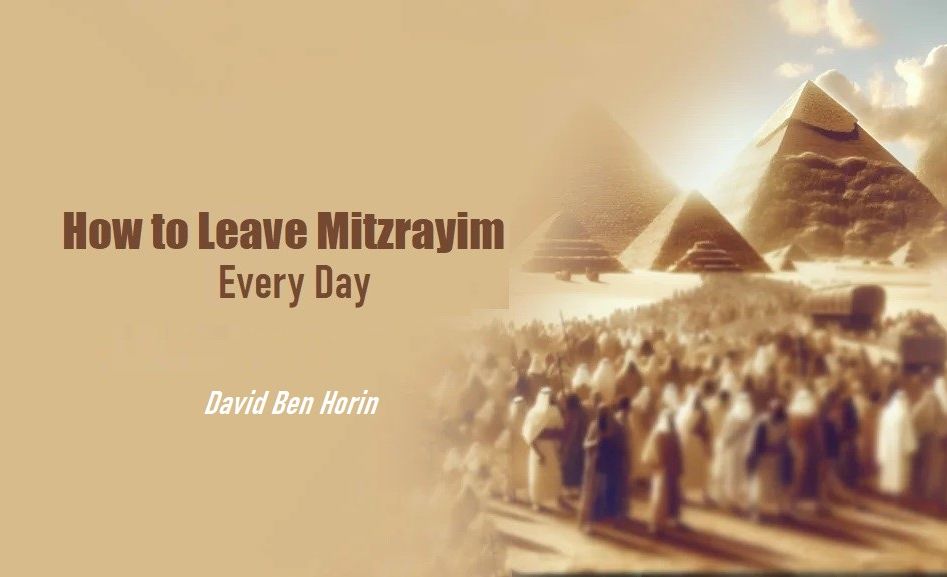
Evil’s Easy Street
Don't be jealous of a person who lives carefree life; this world is like a big restaurant – after you eat, you have to pay the bill.

Thought, Speech, and Deed
The Baal Shem Tov teaches that grief from one’s children stems from a blemish in the neshama, the part of the soul that corresponds to thought, since the seed originates in the brain. Therefore, when a person suffers from his children, it’s a measure-for-measure message to help him realize that he must rectify something in his own thoughts.
Troubles from one’s wife indicate a blemish in ruach, the part of the soul that corresponds to speech. Therefore, when a person suffers from his wife, it’s a measure-for-measure message to help him realize that he must rectify something in his speech.
Financial difficulties indicate a blemish in nefesh, the part of the soul that corresponds to deeds. Therefore, when a person suffers from money problems, it’s a measure-for-measure message that he must rectify his deeds.
Hashem’s Children
Since Hashem calls us “His children,” problems from our own children are likely to be a turn for a turn resulting from similar grief we cause Hashem, Heaven forbid. For example, when a person’s son is disobedient, then that person has probably been disobedient to Hashem. Insolent children are indications of brazen and insolent parents. In our own soul-searching, we should pay attention how our children treat us, for that’s an indication of how we treat Hashem. Furthermore, we should make a concerted effort to atone for our own sins against our parents.
The old adage says that the chickens come home to roost. Ultimately, our own children treat us in the same manner that we treat our parents.
Against or Complementary?
The biblical word that describes the wife is kenegdo (see Bereishit 2:18); this word can mean either “against” or “complementary.”
The nation of Israel is the proverbial wife of Hashem. As such, a wife’s treatment of her husband reflects her husband’s treatment of Hashem. A disrespectful wife is a sign that a husband is disrespectful to Hashem. A lazy wife is a sign that the husband is lax in his duties toward Hashem, and so forth.
Our Sages teach that when a husband so merits, his wife is a “complementary” helper to him. But, when he isn’t worthy, his wife is “against” him – an enemy! The husband’s deeds actually dictate the wife’s behavior.
Jewish esoteric thought teaches that a wife is the mirror of her husband – in her, he can see himself, his character traits, his strengths and weaknesses, and the like. Furthermore, the husband is like the sun and the wife is like the moon – she reflects his light. As such, when she is short-tempered, he must rectify his problem with anger. When she is amiss in her responsibilities, he is most certainly faulty in fulfilling his obligations to Hashem.
Many marital difficulties are indications of the husband’s lack of faith, arrogance, or lewd behavior.
Evil’s Easy Street
Hashem uses the policy of a turn for a turn as an educational tool to teach those that He loves what they need to correct. The Talmud teaches (Tractate Berachot 5a) that Hashem sends suffering to those He loves, for He desires to cleanse their souls of blemishes in this world, so that they can earn a lofty place in the world to come.
Some people are so steeped in evil that Hashem doesn’t even bother with them. Rather than sending them tribulations that they wouldn’t heed or learn from anyway, Hashem gives them their rewards in this world so that they forfeit any reward in the Next World.
The righteous undergo rigorous soul corrections in this world and are rewarded with eternal bliss and gratification in the Next World. The evil on Easy Street frequently enjoy money, power, fame, or other cheap amenities in this world, but they pay “through the nose” in the Next World. Don’t be jealous of a person who lives carefree life; this world is like a big restaurant – after you eat, you have to pay the bill.
Tribulations of Love
Tribulations of love are an additional type of suffering designed especially for the righteous and the pious. Our Sages teach us that if a person suffers, then he or she should initiate some serious self-evaluation and do teshuva. If their assessment of themselves comes up clean, then they’ve probably been lax in their Torah study. If they’ve been diligent in their Torah study, then their tribulations are tribulations of love.
The Middle Path
Most people don’t belong on evil’s Easy Street or on the tribulation trail of the righteous. The vast majority of us “middle-of-the-roaders” should remind ourselves that there are no tribulations without transgression. We therefore should train ourselves to look for the turn for a turn in our troubles, so that we’ll know what to correct. Once we realize what we’ve done wrong, we should begin the 4-stage process of teshuva – confession to Hashem, remorse, apology for our misdeeds, and decision to improve from this moment on. Once we understand Hashem’s message and act on it, Hashem doesn’t need to use the language of tribulations any more!
Nobody wants trials and tribulations. But once they’re there, they’re a good sign, demonstrating that Hashem cares about us and is calling us to get closer to Him.
A person who wants to correct his or her soul but doesn’t know what to correct should talk to Hashem, and ask him to illuminate their eyes and brains. They might say, for example: “Hashem, please help me understand what I did wrong. Have mercy on me, and explain to me why I’m suffering. I want to get close to You; I want to improve, to make You proud of me. Please help me!” Persistent and sincere personal prayer, speaking to Hashem in your own words, seldom goes unanswered. Eventually, Hashem shows those who seek Him what they need to correct.
To be continued…









Tell us what you think!
Thank you for your comment!
It will be published after approval by the Editor.